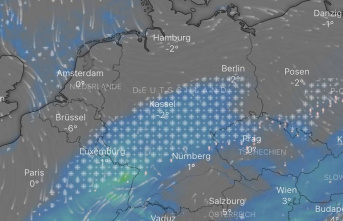At the end of the IX Summit of the Americas, which takes place in Los Angeles, the White House has announced that Spain will double the number of work visas for Hondurans, within the framework of a major migration agreement. In 2022, it is expected that 250 Honduran agricultural workers will arrive within the framework of this program, so the total would be 500. The Deputy Assistant Secretary of State of the United States Emily Mendrala was in Madrid in May to negotiate these quotas with her Spanish counterpart. and launch the first meeting of the Spain-US Working Group on Central America. She now attends ABC in Los Angeles and says that the program's capacity can be expanded.
You were in Spain last month negotiating this reception of Central American workers.
Do you think that the announcement that the quota for Honduran temporary workers is doubling is enough?
Spain is incredibly committed to Latin America. I was there leading an institutional delegation from the United States, to participate in a working group on Central America. We talk about Central America and about working more closely because we share common analyzes and approaches. And it would be a great opportunity to collaborate more closely. In today's declaration, Spain and other countries have committed to applying the principles contained in the declaration with concrete actions. Spain promised to double the labor routes of Hondurans to Spain there. There is a program for temporary workers from Central America who have the skills required by the Spanish labor market and can travel temporarily to work and then return to their country of origin.
Is it a program similar to the one in the US?
That's right, the US has a visa program, called H-2 in which we do the same thing, we allow the hiring of temporary workers. Our employers make the offers from the US for them to come and work temporarily and then return to their home country.
But the program that is going to be doubled is what is called a "circular migration pilot project" with Honduras, which has materialized with the arrival of the first contingent of workers from the Central American country: there are 250 Honduran workers. Hundreds of thousands arrive in the US. Is what Spain does enough?
It's really important. It is important because it is a legal way. It shows Hondurans that there is a possibility to apply for visas and be accepted. And the hardest thing about these programs is setting up the infrastructure. And once the infrastructure is in place, they can grow. We have also verified that.
So, could that number grow?
In Central America, we have expanded the allocation of temporary workers to come to the US and we have reserved a set of visas for Central American workers. The first year it was somewhat difficult to establish mechanisms in Central America to make the process more fluid. We have learned many lessons. We have improved a lot in the last year, working with the labor ministries of the countries of northern Central America, and we will continue to grow and improve.
But can Spain do more now, since there are only 250 Hondurans?
We are very happy with the US-Spanish working group on Central America. And I believe that this space can bear much fruit so that we coordinate more closely, so that there is a multiplier effect of the work that we are doing if we are able to coordinate better. And I think that Spain plays a very important role in all of Latin America. Then, in the issues that I work on more closely, I see great potential for us to do more things together in Central America.
Is there agreement at this time between Spain and the US on the policy towards Cuba and Venezuela?
We coordinate closely with Spain. We are in contact all the time with Spain about our policies around the world, as we also do with the European Union. And it is vital that we do so not only because of Spain's history in the region, but because of the close cooperation we share on many political issues. We do not always agree with regard to Cuba, Venezuela and also in some aspects of Central America in the way of applying our policy. But the alliance that we share and the cooperation and dialogue are very important.
What did you think of the speech by Argentine President Fernández, criticizing the fact that the regimes of Venezuela and Cuba were not invited?
We welcome all kinds of dialogue at the Summit of the Americas, and we often said so in the run-up to the summit when we extended invitations and dialogue with countries throughout the region. Come discuss. Come and make your voice heard. That is the spirit of the Summit of the Americas, the opportunity to meet in a spirit of democracy and share opinions and exchange dialogue. And so I think we stand by the decisions we make about who to invite and who not to. President Biden said that he tried to find a way forward and ultimately ended up siding with the Inter-American Democratic Charter. And we maintain that decision but we respect the opinions of the entire continent.
And about what President Fernández said about renewing the leadership of the Organization of American States?
We really value the OAS and we see it as a vital mechanism to bring the region together, to talk about difficult issues, also about common issues, and we see it as a very positive mechanism for the region, and one that we support.












